IRGC deputy pledges attack on Israel at the right time
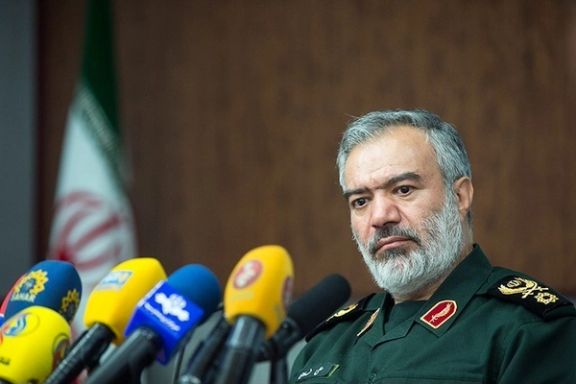
Iran's response against Israel will be executed at a time and under circumstances deemed appropriate, Iran's Revolutionary Guards Deputy Commander Ali Fadavi said on Wednesday.

Iran's response against Israel will be executed at a time and under circumstances deemed appropriate, Iran's Revolutionary Guards Deputy Commander Ali Fadavi said on Wednesday.
"Since its inception, the Islamic Revolutionary Guard Corps has consistently fulfilled its commitments. The organization emphasizes that, in due course and under conditions deemed appropriate, the Operation True Promise will be realized, with confidence placed in divine guidance," Fadavi said.
Tehran refers to its direct strikes on Israel as "Operation True Promise," with the first strike occurring in April and the second in October.

Iran’s oil minister denied reports on Wednesday that oil exports have declined, even as the Iranian currency continued its downward spiral and the country faced acute shortages of natural gas and electricity.
Speaking after a weekly cabinet meeting, Mohsen Paknejat dismissed the reports as part of “the enemies’ psychological warfare,” pointing blame to the impact of global sanctions, stating, “We have no problems with selling oil, and measures have been put in place that will continue to prove effective in the future.”
The United States imposed third-party sanctions on Iran’s oil exports in 2018 when it withdrew from the 2015 JCPOA nuclear deal. China has been the only major buyer who has allowed Iranian oil to enter its refineries, gradually increasing the volume since 2021.
Earlier this month, reports surfaced suggesting a significant drop in Iran’s oil deliveries to its primary consumer, China, during October and November. A commodities trader added to the speculation last week by tweeting that sales to China halved in December, falling below 800,000 barrels per day, compared to nearly double that amount during the first eight months of 2024.
However, data from tanker tracking firm Kpler shows that there is no clear evidence of such a substantial decline, making conclusions about December's final numbers as yet unclear. Iranian oil offloading in China can fluctuate significantly day-to-day, with below-average deliveries in the first half of the month potentially being offset by above-average shipments in the second half.
Earlier this month, Iran International reported that Tehran’s oil deliveries to China showed a steadily decline in October and November, based on information received from tanker tracking firms.
The decline could have several reasons, among them the closure of the small Chinese refineries due to environmental reasons. Another reason could be the return of Donald Trump who has pledged to resume his “maximum pressure” on the Islamic Republic of Iran.
China accounts for 95% of Iran's oil exports, but it does not purchase the oil directly. Instead, small independent refineries buy Iranian oil after it is blended with crude from other countries, ensuring it is not labeled as Iranian by Chinese customs, in order not to overtly violate the US sanctions.
Nevertheless, as Iran offers significant discounts to Chinese buyers and absorbs the additional costs of concealing shipments to bypass sanctions, it fails to generate sufficient revenue to sustain its oil-dependent economy.
Since the imposition of US sanctions, Iran’s currency has depreciated 18-fold, while persistent inflation has exceeded 40% over the past five years. The sanctions have also hindered the country’s ability to invest in maintaining natural gas production and upgrading its power grid, resulting in severe energy shortages that have paralyzed the country.
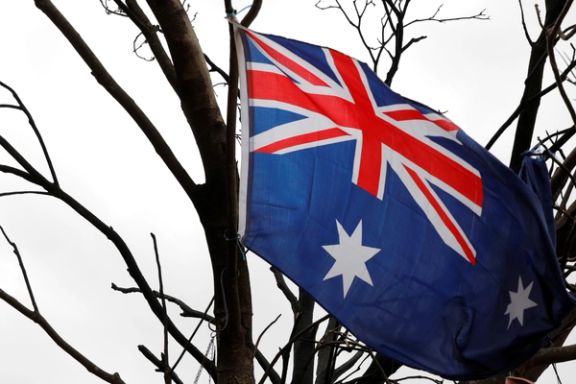
Ministers from the UK and Australia on Monday condemned Iran’s attacks on Israel, its supply of missiles and UAVs, and growing military ties with Russia at the Australia-UK Ministerial Consultations (AUKMIN) in London.
They also stressed that Iran must never develop nuclear weapons and urged accountability for human rights abuses, including the persecution of women, girls, and minorities.
"Ministers reaffirmed their determination that Iran must never develop a nuclear weapon, emphasizing that the ongoing escalation of its nuclear program lacks any credible civilian justification," the statement released on Tuesday read.
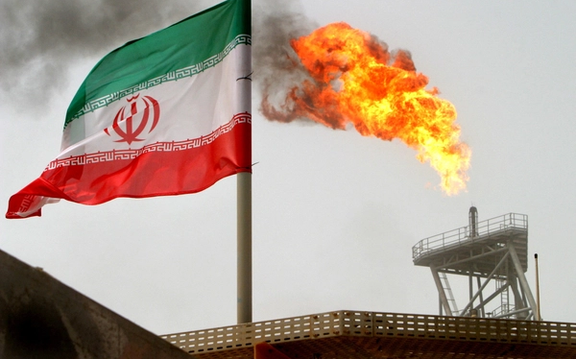
Iran's Revolutionary Guards have tightened control over the country's oil industry and now manage up to half of exports, funding its military capabilities and those of armed allies across the Middle East according to a Reuters report.
Western officials, security experts, and Iranian trading sources cited by the news agency said the Islamic Revolutionary Guard Corps (IRGC) now control up to half of the country's oil exports, up from around just a fifth three years ago.
The Islamic Republic, despite harsh sanctions by the United States and its allies, generates more than $50 billion a year in oil revenue - a key lifeline for foreign currency.
Iran's entire oil industry has now fallen under the sway of the Revolutionary Guards, Reuters reported citing over a dozen interviewees, including the ships covertly transporting sanctioned crude to logistics and front companies facilitating oil sales.
China is Iran's top customer and China Haokun Energy, a front company operated by former Chinese military officials, remains an active conduit for the sales despite being slapped with US sanctions last year.
The sources, who requested anonymity due to the sensitivity of the topic, shared insights derived from intelligence documents and tracking ships linked to the IRGC.
Last week, Iran International reported that the Revolutionary Guards are attempting to sell oil stored in China ahead of tougher sanctions expected under US President-elect Donald Trump, according to an informed source.
The source, speaking on condition of anonymity, said that Iranian authorities have instructed the IRGC to sell the sanctioned oil stored at Dalian Port in northeast China through intermediary firms.
The IRGC’s increasing dominance in the oil sector strengthens its overall influence across Iran's economy and complicates the effectiveness of Western sanctions, as the organization is already designated as a terrorist group by the United States and its allies.
According to Iran’s national budget, at least $12.6 billion from oil exports is allocated to the IRGC. This revenue enables the group to sell oil primarily to Chinese buyers and fund its military capabilities and allied militias in the Middle East.
Iran circumvents US and allied sanctions by rebranding its oil, often using tankers from a dark or shadow fleet operating in Malaysian and Singaporean waters.
These tankers relabel Iranian oil as originating from Iraq, the UAE, Oman, or Malaysia, after which it is delivered to China's smaller independent refineries, known as teapots.
While Shandong Port in China remains the primary hub for this rebranded oil, tanker-tracking data shows a notable increase in shipments to Dalian Port this year.
In response, the US Treasury Department recently blacklisted 45 tankers involved in transporting Iranian oil to Shandong. Despite these measures, over 100 large vessels in the dark fleet remain unsanctioned, according to data from Vortexa, continuing to transport Iranian oil to China, albeit at reduced volumes.
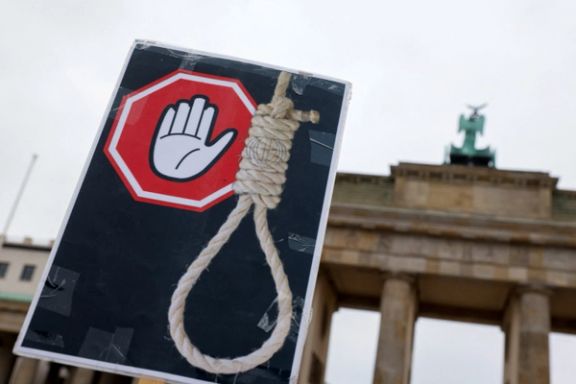
At least six prisoners were executed at Ghezel Hesar Prison in Karaj on Wednesday, according to the US-based Human Rights Activists News Agency (HRANA).
One prisoner was convicted of murder, four were sentenced to death for drug-related charges, and one was executed on charges of "spreading corruption on earth" by instilling fear in women and causing them harm.
This comes as the Iran Human Rights Organization reports a sharp rise in executions across the country, with at least 166 people hanged in October alone—the highest monthly total in over 20 years.
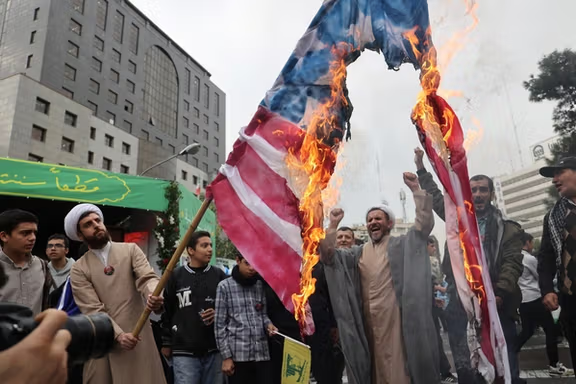
Iranian MP Mojtaba Rahmandoust warned Tuesday that if American flags on youth clothing are not stopped, young people will soon start tattooing the Israeli flag.
The MP expressed concern that Iran’s regional allies might view such behavior among the youth unfavorably, interpreting it as a reflection of poor judgment rather than an affinity for these nations.
“Should foreign photographers or international media outlets circulate images of our people wearing garments adorned with the American or Israeli flag, our standing in the Islamic world and among the members of the Axis of Resistance [Tehran-backed armed groups] would be severely compromised," he added. "It must be emphasized that many of the young individuals who bear tattoos of the American flag or don attire featuring it do so out of ignorance, and not from any heartfelt belief in the United States or Israel."
This sentiment comes as Tehran hardliners regularly burn Israeli and US flags during rallies, chanting "Death to Israel" and "Death to the US" They also paint these flags on pavements to encourage people to trample them. However, for years, many Iranians—particularly students at universities—have actively avoided stepping on the American and Israeli flags painted by agents of the Islamic Republic.